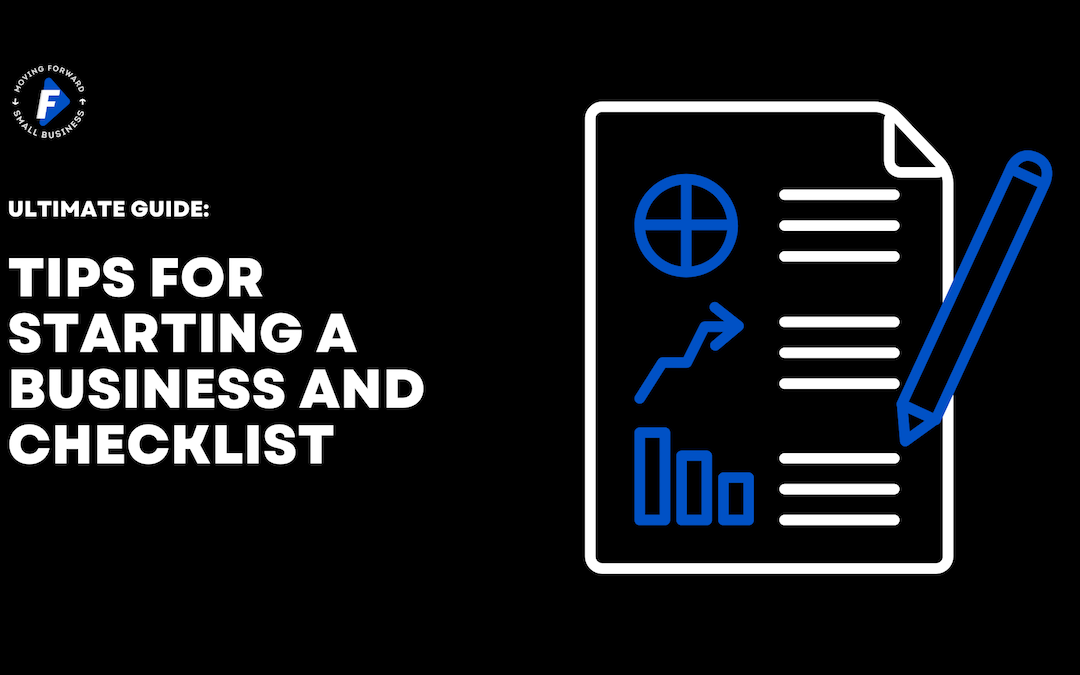Key Highlights
- Starting a small business requires careful planning and research
- A solid business plan is crucial for success
- Conducting thorough market research helps identify your target audience and competition
- Choosing the right business structure is vital for legal and financial purposes
- Securing funding is essential for launching and growing your business
- Establishing a strong brand identity and marketing strategy are key to attracting customers and driving growth
Starting a Business
Starting a business is an exciting venture filled with challenges and opportunities. Before diving into the world of entrepreneurship, it’s crucial to have a solid plan in place. This guide will walk you through the key steps to launch your own business successfully as a new business owner. From identifying your niche and conducting market research to establishing your brand identity and developing a strong marketing strategy, each tip is designed to help you navigate the early stages of business ownership with confidence and clarity. Let’s embark on this journey together and turn your dream of owning a successful business into a reality.
10 Essential Tips for Launching Your Business Successfully
When launching your business, here are 10 essential tips to ensure success without missing critical steps: Firstly, identify your unique business idea and choose a memorable business name to stand out in the market. Conduct thorough market research to understand customer needs. Craft a detailed business plan outlining your goals and strategies. Secure adequate funding through small business loans or investors. Choose the right business structure considering legal and financial implications. Register your business and obtain the necessary licenses to operate legally. Establish a strong brand identity to resonate with your target audience. Set up efficient business operations and prioritize customer service for long-term success. Develop a robust marketing strategy, including digital channels like social media and email marketing. Lastly, prepare for growth and scaling to adapt to changing market demands and expand your customer base. Don’t forget to purchase an insurance policy to protect your business from incidents such as property damage, theft, or customer lawsuits.
1. Identify Your Unique Business Idea
Use SWOT analysis to identify your unique business idea. This strategic planning tool can help you assess your business’s strengths, weaknesses, opportunities, and threats, allowing you to determine your idea’s feasibility and potential success. By conducting a SWOT analysis, you can gain valuable insights that will guide your decision-making process and set your business up for long-term success.
2. Conduct In-depth Market Research
Before diving into launching your business, conducting in-depth market research is crucial. This process involves analyzing your industry, target customers, and competitors. You can effectively tailor your products or services by understanding market trends and customer needs. Utilize tools like surveys, focus groups, and data analytics to gather valuable insights. Market research forms the foundation of your business strategy, guiding decisions on pricing, marketing channels, and overall positioning. Stay updated on industry changes to adapt your offerings and stay ahead of the competition. Talk with similar businesses and browse your competitors’ websites to gather insights on their strategies and customer feedback. Conducting thorough market research and staying informed about similar businesses sets the stage for a successful business launch.
3. Craft a Detailed Business Plan
Crafting a detailed business plan is crucial for any startup. It serves as a roadmap outlining your business goals, strategies, and financial projections. A well-thought-out business plan not only helps you stay focused but also attracts potential investors or lenders. Including a thorough market analysis, competitor research, and a clear marketing strategy is a good idea in your plan. It is also important to define your unique selling propositions and revenue streams. Your business plan should also contain a clear mission statement and goals that are specific, measurable, action-orientated, realistic, and time-bound. This ensures that your plan is dynamic and adaptable to changes in the market, making it the foundation of your success in the competitive business landscape.
4. Secure the Necessary Funding
Researching different funding options is crucial for securing the necessary capital to launch and sustain your new business. Explore avenues such as small business loans, investors, or even personal savings. Each option has its complexities, so consider the best way to acquire funding for your business based on your business model and financial situation. Creating a solid financial forecast will also help potential investors or lenders understand how their funds will be utilized and repaid. Remember, securing funding is a vital step towards realizing your entrepreneurial dreams and building a successful business that can weather the challenges of the early stages. Tip: Use this advice to determine how much cash your small business should have.
5. Choose the Right Business Structure
Selecting the most suitable business structure is critical for your startup’s success. Consider the nature of your business, the level of personal liability you are willing to assume, and potential tax implications. Common options include sole proprietorship, partnership, limited liability company (LLC), and corporation. Each structure has its advantages and disadvantages, impacting aspects such as tax obligations, management flexibility, and personal injury liability protection. Consulting with a legal or financial advisor to understand which structure aligns best with your goals and vision is a great idea. Make an informed decision to establish a strong foundation for your business.
6. Register Your Business and Obtain Licenses
Ensure compliance by registering your business and obtaining necessary licenses. Registering legitimizes your venture and protects your business structure. Research and secure required permits and licenses, including a seller’s permit for collecting sales tax, suitable for your business type. Consider zoning regulations that may affect your operations. Adhering to legal requirements, including registering your legal name, establishes credibility and ensures smooth operations. Obtain an Employer Identification Number (EIN) for tax purposes and open a business bank account for financial transactions. Licensing protects your business from legal repercussions and demonstrates your commitment to ethical business practices. Stay informed about regulatory updates to maintain compliance and uphold your business reputation.
7. Establish Your Brand Identity
Creating a strong brand identity is essential for business success. Define your brand’s personality and values. Craft a unique selling proposition that sets you apart from competitors. Design a memorable logo and choose a color scheme that reflects your brand essence. Consistency across all platforms is key; from your website to your social media presence, ensure cohesive branding. Engage with your audience authentically to build brand loyalty. Your brand identity should resonate with your target customers, conveying trust and credibility. Establishing a recognizable brand presence is crucial for long-term growth and market positioning.
8. Set Up Your Business Operations
Setting up your business operations efficiently is pivotal for smooth functioning, especially in the early days. Start by establishing a structured workflow outlining tasks, responsibilities, and timelines. Implementing business processes and procedures ensures consistency and quality. Utilize project management tools for task delegation and tracking progress. Consider cloud-based software for flexibility and accessibility. Prioritize cybersecurity measures to safeguard sensitive data—foster communication channels for transparent collaboration. Regularly assess and optimize operational efficiency to adapt to evolving needs. Streamlining your operations from the onset sets the foundation for sustained growth and success.
9. Develop a Strong Marketing Strategy
Developing a robust marketing strategy is crucial to ensure your business stands out. Start by defining your target market and understanding their needs. Utilize social media and email marketing to engage with potential customers. Conduct a thorough market analysis to identify opportunities and stay ahead of competitors. Create a compelling brand message that resonates with your audience. Implement metrics to track the effectiveness of your campaigns and adjust strategies accordingly. Remember, consistency is key to building brand recognition. You can effectively reach your target customers and drive business growth by focusing on a strong marketing plan, including brand development and advertising.
10. Prepare for Growth and Scaling
Utilize your market research findings to anticipate potential growth areas. Establish scalable processes to accommodate increased demand smoothly. Leverage automation tools for efficiency in operations as you scale. Stay adaptable to market trends and adjust your strategies accordingly. Foster strong relationships with suppliers and business partners to support growth. Invest in your team’s development to handle expanding responsibilities effectively. Monitor key performance indicators regularly to track growth. Secure additional funding sources to facilitate scaling when needed. Embrace innovation and continuous improvement to stay ahead in a competitive market. Prepare a solid roadmap for expansion and scaling up your business.
Establishing Your Online Presence
Selecting the right website platform is crucial when establishing your online presence for your new business. Consider user-friendly interfaces, mobile responsiveness, and e-commerce capabilities to engage your customers effectively. Additionally, leveraging social media platforms like Facebook and Instagram is a great way to connect with your audience and drive business growth. Engaging in email marketing can also help expand your customer base and boost brand visibility. By integrating these online strategies, such as creating an online store, into your business plan, you can position your startup for success in the digital landscape.
Choosing the Right Website Platform
When starting a business, selecting the right website platform is crucial. Consider your business needs and goals to determine the most suitable platform for your online presence. Evaluate features like customization options, ease of use, and scalability. WordPress and Shopify are popular choices offering flexibility and user-friendly interfaces. Assess your budget and technical expertise to make an informed decision. Ensure the platform aligns with your branding and marketing strategies to attract and engage customers effectively. A well-chosen website platform can enhance your online visibility and contribute to your business success.
Leveraging Social Media for Business Growth
In today’s digital landscape, leveraging social media marketing for business growth is paramount. By utilizing platforms like Facebook, Instagram, and LinkedIn, businesses can connect with their target audience on a more personal level. Engaging content, strategic advertising, and regular interaction can significantly boost brand visibility and customer engagement. Analyzing data from social media insights helps fine-tune marketing strategies for optimal results. Building a strong social media presence not only increases brand awareness but also drives website traffic and generates leads. Embracing social media as a key business tool can lead to sustained growth and success.
Financial Management for Startups
Managing finances effectively is crucial for startups. Start by tracking all expenses diligently and prioritizing essential costs. Consider using the best accounting software for efficient financial management. Understanding tax obligations and deductions for new businesses is vital to avoid costly mistakes. Explore options for funding like small business loans or grants to support your venture. Monitor cash flow regularly and adjust your financial strategy as needed to ensure sustainability. Seek professional advice when necessary to navigate complex financial matters and set your startup on a path toward financial success.
Managing Startup Costs Effectively
Managing startup costs effectively is paramount to ensure a strong financial foundation for your new venture. Start by creating a detailed budget that outlines all potential expenses. Prioritize essential costs such as initial inventory, equipment, and marketing efforts. Consider cost-saving measures like utilizing online tools for tasks, negotiating with suppliers for better rates, and minimizing unnecessary expenditures, including real estate costs. Monitoring and adjusting your budget regularly in the early stages can help you stay on track and make informed financial decisions to sustain your business through the critical initial phase. Efficient cost management is crucial for long-term success and can save you from having to spend too much money.
Understanding Taxes for New Businesses
Understanding taxes for new businesses is crucial for financial stability. As a small business owner, familiarize yourself with different tax obligations, including income tax, self-employment tax, and payroll taxes. Deductions for business expenses can help lower your taxable income. Consider consulting with a tax professional to ensure compliance with tax laws and maximize tax benefits. Keep accurate records of transactions and expenses throughout the year to streamline the tax filing process. By understanding and managing your tax responsibilities effectively, you can avoid potential penalties and contribute to the long-term success of your new business.
Building Your Team
When starting a business, hiring your initial team is crucial for success. Look for individuals who align with your business vision and possess the skills needed. Fostering a productive work culture is essential to keep your team motivated and engaged. Clearly define roles and responsibilities to avoid confusion. Provide opportunities for growth and development to retain top talent, including independent contractors. Building a strong team from the early stages can significantly impact your business’s growth trajectory. Remember, a dedicated and skilled team is key to navigating the challenges of entrepreneurship.
Hiring Your First Employees
As you transition into the phase of hiring your first employees, consider the significance of finding individuals who align with your business mission. Recruiting top talent to support your vision is crucial for business growth. Ensure you comply with legal requirements when bringing on new team members securing the necessary paperwork and contracts. Fostering a positive work culture from the start can set the tone for a cohesive and productive team. Strategically plan your hiring process to onboard employees with the right skills and fit well within your company culture.
Fostering a Productive Work Culture
Fostering a productive work culture is essential for long-term business success. As a business owner, nurturing a positive environment where employees feel valued and motivated can lead to increased productivity and employee retention. Encouraging open communication, providing opportunities for growth, and recognizing achievements are some strategies to foster a thriving work culture. By prioritizing employee well-being and creating a supportive workplace, you can cultivate a team that is engaged and dedicated to the success of your business. Remember, a productive work culture is the cornerstone of a successful business.
Navigating Legal Requirements
Understanding and complying with legal requirements is crucial for any business. Protecting your intellectual property through trademarks and patents ensures your unique ideas are safeguarded. Staying compliant with regulations specific to your industry and location helps you avoid penalties. Whether it’s setting up an employer identification number or abiding by zoning laws, legal compliance is non-negotiable. Prioritize understanding the legal structure options, such as sole proprietorship or limited liability company, to protect yourself from personal liability. Consult legal experts to navigate the intricate landscape of legal requirements successfully.
Intellectual Property Rights
Intellectual property rights are crucial for safeguarding your innovative ideas and creations. As a business owner, protecting your intellectual property, including trademarks, patents, and copyrights, is essential to maintaining your competitive advantage. Registering your intellectual property ensures that others cannot unlawfully use or replicate your unique assets. In the world of NLP, intellectual property rights apply to the protection of algorithms, software, and other proprietary technologies developed by businesses. Understanding and enforcing these rights can significantly contribute to the success and longevity of your small business in the ever-evolving market landscape.
Compliance with Regulations
Ensuring compliance with regulations is crucial for any business. It involves adhering to local, state, and federal laws governing your industry. Regulated areas may include licensing, permits, zoning, data protection, etc. Non-compliance can lead to fines, lawsuits, or even closure. To stay compliant, regularly review regulations relevant to your business, seek legal advice if needed, and maintain accurate records. Implementing internal controls and staff training on compliance matters can help mitigate risks. Remember, compliance is an ongoing commitment essential for the long-term success and sustainability of your business.
Conclusion
In conclusion, starting a business can be a daunting but rewarding venture. Following the essential tips outlined in this checklist can set a solid foundation for your new venture. Remember to stay focused on your business goals, adapt to market changes, and prioritize customer satisfaction. Embrace the challenges as learning opportunities and be prepared to pivot when necessary. With dedication, strategic planning, and a customer-centric approach, you can increase your chances of building a successful and sustainable business in the long run. If you are looking for help and additional support, check out our small business membership, where we walk with you as you grow. Good luck on your entrepreneurial journey!
Frequently Asked Questions
How Much Capital Do I Need to Start My Business?
To start your business, the required capital varies based on factors like industry, location, and business scale. Research startup costs, consider operating expenses for at least six months, and ensure you have enough funding to support your venture before launch.
Can I Start a Business While Working a Full-Time Job?
Starting a business while working full-time is possible with proper time management and dedication. Ensure your employer allows side businesses, schedule work wisely, and focus on efficient tasks. Balancing both endeavors can lead to success.
What Are the Most Common Mistakes New Entrepreneurs Make?
Failing to conduct thorough market research, underestimating costs, neglecting a solid business plan, ignoring legal requirements, and lacking a strong marketing strategy are common mistakes new entrepreneurs make. Ensuring attention to these areas can lead to a successful business launch.
How Do I Price My Products/Services Competitively?
To price your products/services competitively, analyze competitors’ pricing, consider the value provided, factor in costs, and adjust based on market demand. Regularly review and adapt pricing strategies to stay competitive and profitable.
When Should I Consider Expanding My Business?
Consider expanding your business when you have a stable customer base, consistent revenue streams, and a solid operational foundation. Analyze market demand, assess financial readiness, and ensure scalability before taking the leap toward growth.
What Are the Key Indicators of Business Success?
Key indicators of business success include profitability, customer satisfaction, innovation, market share, and employee engagement. Tracking these metrics helps gauge the health and growth potential of a business. Monitoring financial performance alongside customer and employee feedback is crucial for sustained success.
How Can I Protect My Business Idea?
Consider filing for patents, trademarks, or copyrights to protect your business idea. Use non-disclosure agreements and maintain confidentiality. Implement security measures like restricted access to sensitive information. Seek legal advice to safeguard your intellectual property rights.
















